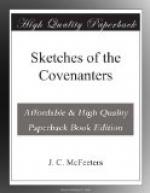The General Assembly had appointed the date and place for a meeting in 1604. The king arbitrarily postponed the meeting one year, and at the expiration of the year postponed it again. But there were high-principled men who resisted the domineering monarch. Nineteen faithful ministers had met with a number of elders, just as fearless and faithful as the ministers, and constituted the Assembly against the king’s specific orders. Their defiance of the king’s authority was at the risk of their lives. This was their last free Assembly for thirty years. These men were haled before the judges, and, being found guilty of disobeying the king, were sentenced. During the next twelve years the king dominated the Assembly, after which he dissolved it, permitting no more meetings while he lived. The Prelatic party henceforth held the power and ruled the Church with a high hand.
[Illustration: Souvenirs of the Covenanters.
Battle-flag, carried at Drumclog; drum, seen at Lochgoin, said to have been in use at the battle of Bothwell Bridge; Captain Paton’s Bible, which he gave his wife from the scaffold; his sword, which he wielded with terrible effect; and a powder horn used in those times.]
The form of worship was changed; human devices, in place of God’s appointments flooded the Church. Departure from the old ways was especially marked by a measure known as the “Five Articles of Perth.” These were sanctioned by the king, and rigorously enforced in his effort to subdue all who resisted or protested. Henceforth Presbyterians had to conform to the new mode of worship, or feel the weight of the law in confiscation, imprisonment, banishment, or death.
These Articles of Perth were sanctioned by the Parliament. This act of ratification was accompanied by a remarkable demonstration of Providence. Parliament was then evidently carrying out the will of the king, for the subversion of the Presbyterian Church, the Reformed religion, the liberty of conscience, and the rights of the people. Parliament met for this purpose in Edinburgh, August 4, 1621. The morning was gloomy. With the advancing hours the clouds grew denser and darker; the whole sky became covered with blackness; a storm of divine wrath seemed to bend the very heavens with its weight. Just at the moment when the Marquis of Hamilton, performing the final act of ratification in the name of the king, touched the official paper with the scepter, a streak of lightning blazed through the gloom, and another, and a third, blinding the guilty men in the presence of their awful deed. Three peals of thunder followed in quick succession, making every heart tremble. A momentary pang of conscience must have been felt, while the king of heaven spoke in thunder that made their ears tingle, and in flames that dazzled their eyes. This dismal day, July 25, 1621, is remembered in Scotland as “Black Saturday.” Oh, how black with storm clouds, with man’s guilt, with heaven’s rebukes, and with apprehensions of sorrow and suffering!




